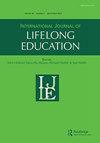弥合“教学差距”:信息和通信技术教师如何帮助老年人获得数字技能
IF 1.9
Q2 EDUCATION & EDUCATIONAL RESEARCH
引用次数: 2
摘要
关于数字包容的现有研究表明,老年人(65岁以上)的数字技能总体上低于其他年龄组。虽然老年人可以通过ICT教师的“冷”(正式)培训或家人和朋友的“热”(非正式)支持获得数字技能,但研究表明,正式培训更为有效。利用26名ICT教师的定性访谈数据,我们1)研究了他们的支持如何有助于老年人获得数字技能,2)探讨了ICT教师在老年人数字包容中的作用。在我们的研究中,教师确定了具体的策略,以解决老年人在获取数字技能时面临的心理和年龄相关障碍。家人和朋友提供的“温暖”支持是“冷”训练背后的双刃剑。一方面,他们赠送设备,鼓励学习,塑造学习欲望。另一方面,由于在时间、耐心和专业知识方面受到非正式支持的限制,参与者转向ICT培训。根据教师的描述和现有文献,我们认为ICT教师在老年人的数字包容中发挥着必要的作用,因为他们缩小了温暖的专家留下的“教学差距”。本文章由计算机程序翻译,如有差异,请以英文原文为准。
Bridging the ‘instruction gap’: how ICT instructors help older adults with the acquisition of digital skills
ABSTRACT Existing research on digital inclusion has shown that older adults (65+) are, in general, less digitally skilled than other age groups. While older adults can gain digital skills through ‘cold’ (formal) training by ICT instructors or through ‘warm’ (informal) support from family and friends, studies have suggested that formal training is more effective. Drawing on qualitative interview data of 26 ICT instructors, we 1) examine how their support contributes to the acquisition of digital skills in later life, and 2) explore the ICT instructors’ role in the digital inclusion of older adults. The instructors in our study identify specific strategies to address the mental and ageing-related barriers faced by older adults in acquiring digital skills. The ‘warm’ support provided by family and friends is a double-edged reason behind the need for ‘cold’ training. On the one hand, they gift devices, encourage uptake, and shape learning desires. On the other hand, participants turn to ICT training due to the limitations of informal support in terms of time, patience, and expertise. Drawing on the instructors’ descriptions and existing literature, we argue that ICT instructors play a necessary role in the digital inclusion of older adults as they close the ‘instruction gap’ left by warm experts.
求助全文
通过发布文献求助,成功后即可免费获取论文全文。
去求助
来源期刊

International Journal of Lifelong Education
EDUCATION & EDUCATIONAL RESEARCH-
CiteScore
3.10
自引率
27.80%
发文量
40
期刊介绍:
The International Journal of Lifelong Education provides a forum for debate on the principles and practice of lifelong, adult, continuing, recurrent and initial education and learning, whether in formal, institutional or informal settings. Common themes include social purpose in lifelong education, and sociological, policy and political studies of lifelong education. The journal recognises that research into lifelong learning needs to focus on the relationships between schooling, later learning, active citizenship and personal fulfilment, as well as the relationship between schooling, employability and economic development.
 求助内容:
求助内容: 应助结果提醒方式:
应助结果提醒方式:


